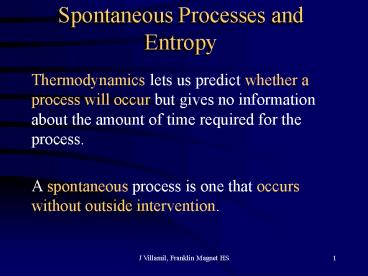Spontaneous Processes and Entropy - PowerPoint PPT Presentation
1 / 12
Title:
Spontaneous Processes and Entropy
Description:
Thermodynamics lets us predict whether a process will occur but gives no information about the amount of time required for the process. A spontaneous process is one ... – PowerPoint PPT presentation
Number of Views:308
Avg rating:3.0/5.0
Title: Spontaneous Processes and Entropy
1
Spontaneous Processes and Entropy
- Thermodynamics lets us predict whether a process
will occur but gives no information about the
amount of time required for the process. - A spontaneous process is one that occurs without
outside intervention.
2
Entropy
- The driving force for a spontaneous process is an
increase in the entropy of the universe. - Entropy, S, can be viewed as a measure of
randomness, or disorder.
3
Positional Entropy
- A gas expands into a vacuum because the expanded
state has the highest positional probability of
states available to the system. - Therefore,
- Ssolid lt Sliquid ltlt Sgas
4
The Second Law of Thermodynamics
- . . . in any spontaneous process there is always
an increase in the entropy of the universe. - ?Suniv gt 0
- for a spontaneous process.
5
Free Energy
- ?G ?H ? T?S (from the standpoint of the
system) - A process (at constant T, P) is spontaneous in
the direction in which free energy decreases - ??G means ?Suniv
6
Effect of ?H and ?S on Spontaneity
7
The Third Law of Thermodynamics
- . . . the entropy of a perfect crystal at 0 K is
zero. - Because S is explicitly known ( 0) at 0 K,
S values at other temps can be calculated.
8
Free Energy Change and Chemical Reactions
- ?G? standard free energy change that occurs if
reactants in their standard state are converted
to products in their standard state. - ?G? ?np?Gf?(products) ? ?nr?Gf?(reactants)
9
Free Energy and Pressure
- ?G ?G? RT ln(Q)
- Q reaction quotient from the law of mass action.
10
Free Energy and Equilibrium
- ?G? ?RT ln(K)
- K equilibrium constant
- This is so because ?G 0 and Q K at
equilibrium.
11
Temperature Dependence of K
- y mx b
- (?H? and S? ? independent of temperature over a
small temperature range)
12
Reversible v. Irreversible Processes
- Reversible The universe is exactly the same as
it was before the cyclic process. - Irreversible The universe is different after
the cyclic process. - All real processes are irreversible -- (some work
is changed to heat).































